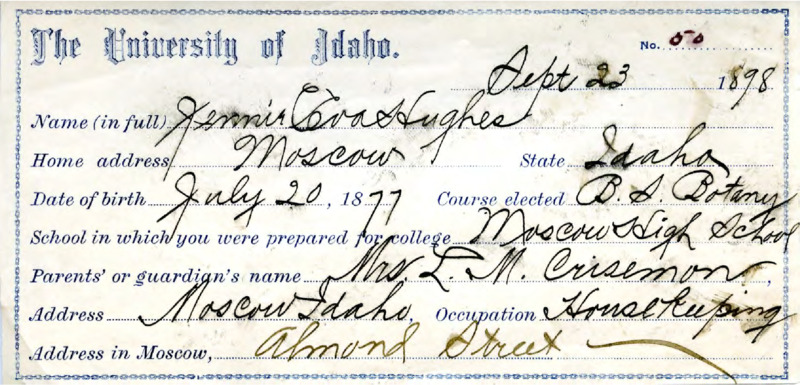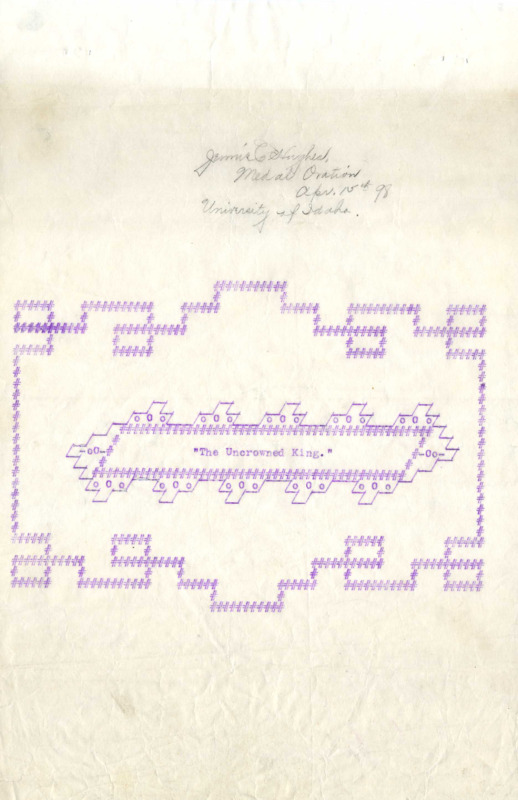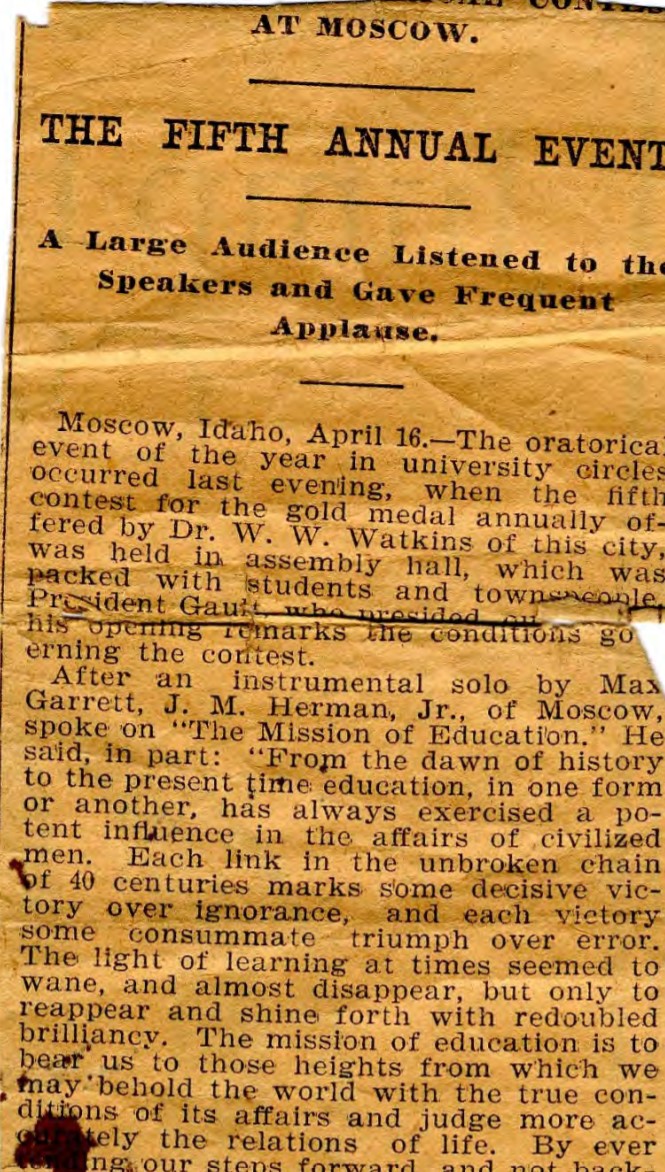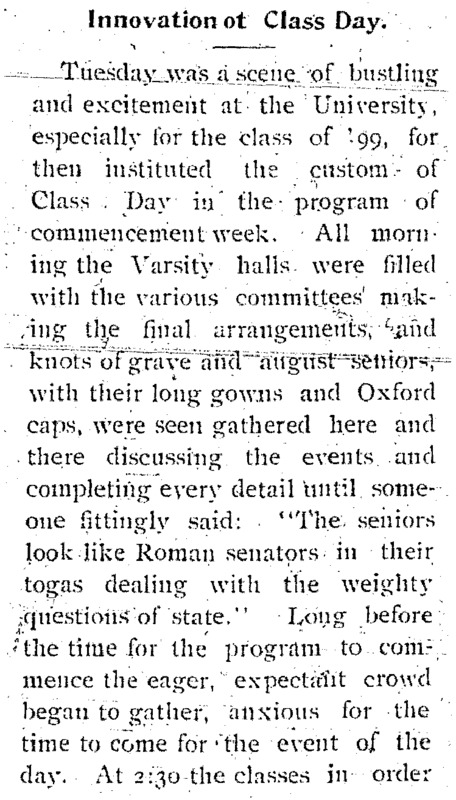The First Black Graduates of UI: Jennie Eva Hughes
Starting at the beginning, the University of Idaho was founded in 1889 by Governor Stevenson when he signed the Territorial Legislature’s Council Bill No. 20.1 The first graduating class of the University was 1896, which saw a total of four graduates: two White men and two White women. This graduating class is not unusual for the time in the Northwest United States, especially before the First and Second Great Migrations in the 20th century; however, the enrollment during the 1895-1896 school year was peculiar.
Jennie Eva Hughes was the first Black/African-American student to enroll at the University of Idaho in 1895 after graduating from Moscow High School on April 26, 1895.2 Though not much is known about her father, Alexander Hughes, it is known that her mother, Louisa, and her stepfather, Lewis E. Crisemon, were soon married after Jennie Eva Hughes’s birth. The Crisemon family moved west, first stopping in Pennsylvania, where Louisa had their first child, Gertrude. Eventually, the family resettled in Moscow, Idaho, during the 1890s, joining the 201 Black/African-American families in Idaho and becoming the only Black/African-American family in Moscow.3
The Crisemon family became quite reputable within Moscow. Hughes’s father likely became a successful businessman of either a restaurant or barbershop (those were the only two professions open to Blacks/African-Americans at the time),4 and her mother worked as a houseworker in the Moscow area as evidenced by Jennie Eva Hughes’s 1898 registration card.5
This apparent ease of the Crisemon family to blend in with the town of Moscow does suggest that the small town may not have been as racially barring toward the small migration of Black people as other western towns at the time. This certainly would have made life easier for the Crisemons in the Moscow area; however, recent work concerning Moscow history in the early 20th century somewhat damages that perspective.
In an article published by NPR, James Lowen (a sociologist and historian) discussed his research into sundown towns across the United States and notes that Moscow was one such town.6 Somewhere between 1904 and 1909, the Chinese population of Moscow was driven out of the town by “cowboys,” which certainly highlights a racist attitude towards the town’s non-white inhabitants.7 While this took place after the Hughes family settled in Moscow, it is an essential element to remember as the town would not have developed this line of thought overnight. This information certainly makes Jennie Eva Hughes’s story all the more impressive, as she not only settled in the area, but also attended the University of Idaho and obtained her bachelor’s degree.
Looking at Hughes’s academic career in Moscow and at the University of Idaho, she was an excellent student who excelled in her studies. She is noted as having “…accumulated an admirable academic record”8 and certainly showed her excellence within the classroom. In 1898, she won the Watkins Medal for Oratory with her speech “The Uncrowned King,” which received significant recognition from both the judges and the general public.9 The judges delivered their highest commendations towards Hughes, stating that
Miss Hughes is a member of the junior class, an excellent student, and the only colored student in the institution. Her oration was well-written and her delivery excellent. The contest was the best thus far in the history of the university, and reflected high honor on all the participants. 10
This opinion held by the judges is interesting, especially in a competition hosted by and competed in with an overwhelmingly White assembly.
Similar reactions were had within the Argonaut, the University of Idaho’s own student-run newspaper, which commended Hughes again in their June 1st edition of 1899 saying, “Miss Hughes had proven herself a competent orator prior to class day, having won the Watkins’ Medal, but she captivated everyone Tuesday with her excellently delivered oration.”11 The number of commendations and amount of respect that Hughes received from both the student body and the faculty shows that she was held in high esteem amongst her peers.
In 1899, she would graduate with her Bachelor of Science degree, giving a speech to her class to “occupy positions of usefulness.”12 Jennie Eva Hughes eventually married George Augustus Smith in 1899 and grew a family in the North Idaho area where they also owned several properties. However, Hughes and her family would eventually move to the Spokane area due to Hughes finding the primarily White mining towns of North Idaho to be unsafe for her children. Though no record of any particular incidents are mentioned, this is another signal that the area may have been racially hostile in the early 20th century.13 Despite this, Hughes’s son Berthol returned to the area to attend the University of Idaho as its third Black/African-American student, though he tragically died in 1919 before he graduated.
Notes
- “Historical Timeline of the University of Idaho,” University of Idaho Library, https://www.lib.uidaho.edu/special-collections/uitimeline.html. ↩
- “The Great Migration, 1910-1970,” United States Census Bureau, 2012, https://www.census.gov/dataviz/visualizations/020/. ↩
- Frazee Paul, “Jennie Eva Hughes Smith,” BlackPast, 2021, https://www.blackpast.org/african-american-history/jennie-eva-hughes-smith-1877-1939/. ↩
- Shannon Michelle, “The First Black Graduate – Jennie Eva Hughes,” Black History at the University of Idaho, 2022, https://www.lib.uidaho.edu/blackhistory/features/hughes.html. ↩
- “Jennie Eva Hughes’ 1898 registration card at University of Idaho,” Black History at the University of Idaho, https://www.lib.uidaho.edu/blackhistory/items/ma2000_29_001.html. ↩
- Vincent Robyn, “Despite It’s Optics, An Idaho College Town Remains a Complicated Place for People of Color,” 2021, https://www.kunc.org/2021-09-13/despite-its-optics-an-idaho-college-town-remains-a-complicated-place-for-people-of-color. ↩
- Vincent Robyn, “Despite It’s Optics, An Idaho College Town Remains a Complicated Place for People of Color.” ↩
- Keith Peterson, This Crested Hill: an illustrated history of the University of Idaho (Moscow: University of Idaho Press, 1987). ↩
- “The Uncrowned King by Jennie Eva Hughes,” Black History at the University of Idaho, https://www.lib.uidaho.edu/blackhistory/items/mg5758_003.html. ↩
- “Spokesman article about Jennie Eva Hughes’ oration win,” Black History at the University of Idaho, https://www.lib.uidaho.edu/blackhistory/items/mg5758_004.html. ↩
- “Innovation of Class Day,” _Argonaut, _June 1, 1899, https://digital.lib.uidaho.edu/digital/collection/argonaut/id/1292. ↩
- Frazee Paul, “Jennie Eva Hughes Smith.” ↩
- Frazee Paul, “Jennie Eva Hughes Smith.” ↩





